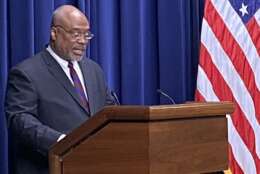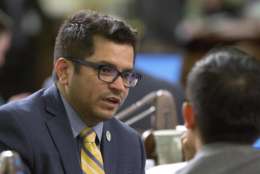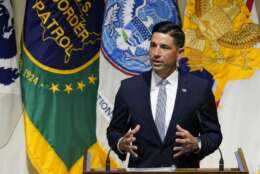Department of Homeland Security
-
The Trump administration left open more non-competitive positions near the end of its four years in office compared to the two previous terms. Some of those vacancies persisted, with the tenure of acting leadership outlasting that of permanent appointees at several key positions.
January 27, 2021 -
Homeland Security's Science and Technology Directorate recently launched a Hacking for Homeland Security effort. Its goal is to find or adapt new technologies needed for DHS missions.
January 26, 2021 -
This program provides a progress report of cybersecurity in the defense and homeland security departments.
January 21, 2021 -
The Office of Federal Procurement Policy released three memos since October to give agencies guidance on buying from AbilityOne firms, emphasizing skills over education in contracts.
January 20, 2021 -
Democrats had hoped to quickly confirm Alejandro Mayorkas, a Obama-era veteran of the Department of Homeland Security, as the new DHS secretary under President-elect Joe Biden. But Sen. Josh Hawley (R-Mo.) has said he will place a hold on Mayorkas' nomination.
January 19, 2021 -
In today's Federal Newscast, the Government Accountability Office sees some progress in the efforts from the Department of Homeland Security to improve employee engagement.
January 18, 2021 -
More than three years after NASA became the first agency to deploy robotic process automation, the rest of the government has come a long way standardizing the rollout of additional bots.
January 13, 2021 -
In today's Federal Newscast, two House lawmakers want to close what they call are loop holes for senior government officials when they leave federal service for the private sector.
January 13, 2021 -
DHS has a new chief information security officer, while the State Department has a new chief data officer and HHS names the first chief artificial intelligence officer as these are some of the changes in the federal technology community over the last few weeks.
January 11, 2021 -
Acting Homeland Security Secretary Chad Wolf is stepping down from his post, days after criticizing President Donald Trump over the riot at the U.S. Capitol.
January 11, 2021 -
The top 10 Reporter’s Notebook stories of 2020 included cybersecurity, acquisition and the seemingly never-ending JEDI saga.
December 23, 2020 -
For the third year in a row, Congress isn't buying the White House's request nor Democrat lawmakers’ pleas for more money to help agencies move away from legacy systems more quickly.
December 21, 2020 -
Current and former federal cyber experts say lawmakers and the White House shouldn’t focus on why the SolarWinds cyber incident happened, but rather how federal cybersecurity needs to change to deal with similar attacks in the future.
December 21, 2020 -
U.S. government agencies and private companies rushed Monday to secure their computer networks following the disclosure of a sophisticated and long-running cyber-espionage intrusion suspected of being carried out by Russian hackers
December 14, 2020 -
Hackers broke into the networks of the Treasury and Commerce departments as part of a global cyberespionage campaign revealed just days after a leading cybersecurity firm said it had been breached in an attack that industry experts said bore the hallmarks of Russian tradecraft
December 14, 2020














